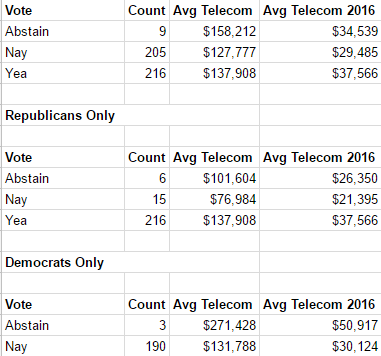Congress Passes Bill to Repeal Internet Privacy Rules
You may have heard. If you haven’t, then you’re about to. Which is exciting for you because not having heard is most likely what Congress was hoping for, for nefarious reasons.
Congress recently passed a bill to repeal the Federal Communication Commission’s privacy rules for Internet Service Providers (referred to as the common acronym ISPs). These rules never had the opportunity to go into effect, but they would have allowed the average consumer more control over how our ISPs use the data they collect on us. They would have required explicit consent from us to sell our most sensitive data.
The point of contention for the ISPs was that these rules would not have applied to the current giants of data collection that we are familiar with. Google, Facebook and the like would have been exempt. The issue I take with this is that consumers actively choose to use these services, and are (somewhat) aware of what they are signing themselves up for when using these services. There is little consumer choice when it comes to choosing an ISP. Given the nature of the business, on average a consumer is limited to a handful of ISPs in a certain location IF they are lucky. From personal experience, I have typically had no choice where I have lived. If Time Warner Cable chooses to start selling my personal data for profit I will have to either start taking measures to hide my browsing via a VPN, give up the internet altogether (not likely), or just suck it up and come to terms with the fact that my sensitive data is now being sold to the highest bidder.
Now, from the surface, this may not sound like a big issue to you. Ad networks are already tracking your browsing behavior in order to serve you targeted ads. Have you ever been browsing the internet after viewing a few products on Amazon, only to have that product you were looking at before appearing on a completely different website egging you on to come back and purchase? This is targeted advertising in action. You can avoid this easily by clearing your browsers cookies periodically, or resetting/clearing your ad ID on mobile devices to avoid ads within mobile applications. With the ISPs no longer having to worry about conforming to the rule from the FTC in the future, we will see more of these companies sharing our data to increase profit margins and not necessarily offering the average consumer any way to opt out.
With the increasing number of breaches of private data in recent years, do we really want more companies who definitely do NOT have a large enough information security budget to be holding on to sensitive data about us? I will continue to advocate for increased options for consumers to keep a short leash on their personal data. Also, here is your reminder that your political representatives do not always have your best interests in mind:

SOURCE: Center for Responsive Politics
This data shows the split on who voted for the bill, as well as how much the ISP companies have spent lobbying for each candidate to manipulate the way they choose to vote.
This bill has yet to be signed by the President, but it is expected to pass. In the short term we wont see any major changes to how we go about our day, but this is at the very least a step in the wrong direction for consumer privacy. That is the biggest issue I take with this.
Anyway, there was my two cents and a brief description of a complex issue.